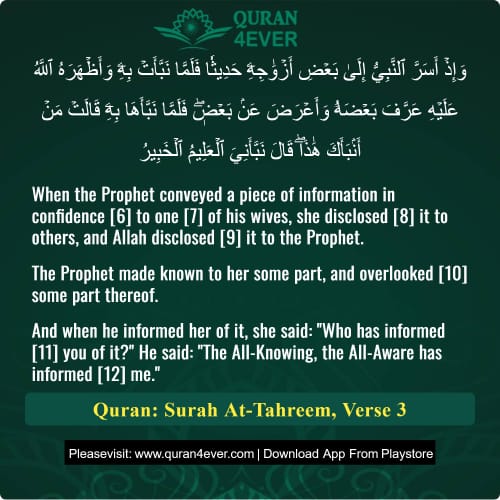
Transliteration:( Wa iz asarran nabiyyu ilaa ba'di azwaajihee hadeesan falammaa nabba at bihee wa azharahul laahu 'alaihi 'arrafa ba'dahoo wa a'rada 'am ba'din falammaa nabba ahaa bihee qaalat man amba aka haaza qaala nabba aniyal 'aleemul khabeer )
"When the Prophet conveyed a piece of information in confidence [6] to one [7] of his wives, she disclosed [8] it to others, and Allah disclosed [9] it to the Prophet. The Prophet made known to her some part, and overlooked [10] some part thereof. And when he informed her of it, she said: 'Who has informed [11] you of it?' He said: 'The All-Knowing, the All-Aware has informed [12] me.'"
🔸 The wife in question here is Hazrat Hafsa (May Allah be pleased with her).
🔸 The Prophet ﷺ had shared confidential information with her, specifically about making honey unlawful for himself and also about Hazrat Maria Qibtiyah (May Allah be pleased with her).
🔸 Hazrat Hafsa later disclosed this information, showing that even the Prophet's family matters were under Allah's oversight. The verse shows that Allah settled even personal matters involving the Prophet ﷺ.
🔸 The Prophet ﷺ had nine wives, five from the Quraish tribe and four from other tribes.
🔸 The Quraish wives were Hazrat Aisha, Hazrat Hafsa, Hazrat Umm Habibah, Umm Salmah, and Sauda.
🔸 The non-Quraish wives were Zainab bint Jahash, Maimoona bint Harith, Safeeyah bint Hay, and Juwayriyyah bint Harith.
🔸 The Prophet ﷺ confided in Hazrat Hafsa regarding two matters: the unlawfulness of honey and the fact that after him, Hazrat Abu Bakr and Hazrat Umar (May Allah be pleased with them) would become the Caliphs.
🔸 Hazrat Hafsa divulged these secrets, particularly the matter about making honey unlawful and the future Caliphs to Hazrat Aisha (May Allah be pleased with her).
🔸 This disclosure led to the Prophet ﷺ questioning Hazrat Hafsa about why she could not keep the secret.
🔸 The Prophet ﷺ did not confront Hazrat Hafsa about the second secret that she revealed (about the Caliphs).
🔸 This reflects the kindness and forbearance of the Prophet ﷺ, as he chose not to mention the second secret, showing mercy and wisdom in dealing with his household.
🔸 When Hazrat Hafsa asked the Prophet ﷺ, "Who informed you of this?", she wanted to know if it was from Divine Revelation or if it was through Hazrat Aisha.
🔸 The Prophet ﷺ’s response was that Allah Almighty had informed him, showing that Allah’s knowledge encompasses all things, including private matters.
🔸 Allah revealed this information directly to the Prophet ﷺ, emphasizing that Allah's knowledge is all-encompassing.
🔸 This highlights the Divine wisdom and the Prophet’s closeness to Allah, as well as the importance of honesty and trust within the household of the Prophet ﷺ.
The tafsir of Surah Tahrim verse 3 by Ibn Kathir is unavailable here.
Please refer to Surah Tahrim ayat 1 which provides the complete commentary from verse 1 through 5.
(65:3) and will provide him sustenance from whence he never even imagined.[10] Whoever puts his trust in Allah, He shall suffice him. Surely Allah brings about what He decrees;[11] Allah has set a measure for everything.
10. It means: keeping the divorced wife in the house during the waiting period, to maintain her and to pay her the dower, or something in addition at departure certainly burdens a man financially. To spend on a woman whom one has already decided to send away because of strained relations will surely be irksome, and if the man is also poor, this expenditure will further pinch him. But a man, who fears Allah, should endure all this gracefully. Allah is not niggardly as the people are. If a person spends his wealth in accordance with His law, He will provide for him in a manner beyond all expectations.
11. That is, there is no power that can prevent Allah’s decree from enforcement.

For a faster and smoother experience,
install our mobile app now.
Related Ayat(Verses)/Topics